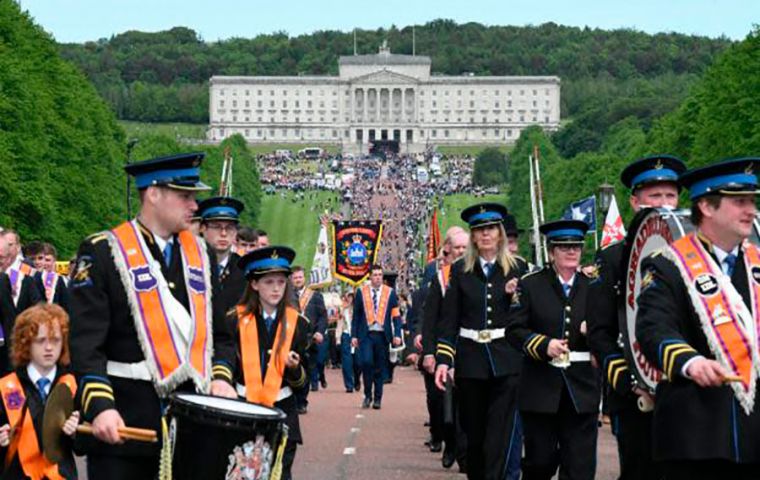MercoPress. South Atlantic News Agency
Another challenge for UK unity: latest census shows Catholics are a majority in Northern Ireland
 When Northern Ireland was founded in 1921 as part of UK, two-thirds of the population was Protestant, in strong contrast to the Catholic Irish state to the south
When Northern Ireland was founded in 1921 as part of UK, two-thirds of the population was Protestant, in strong contrast to the Catholic Irish state to the south For the first time in the century of its existence, Northern Ireland has more residents who identify as Catholic than those calling themselves Protestants, a census has shown, according to results published on Thursday.
When Northern Ireland was founded in 1921 as part of the United Kingdom, two-thirds of the population was Protestant, in strong contrast to the largely Catholic Irish state to the south.
Some observers believe the shift in religious affiliation could boost support for the region to break with the UK, creating a united Ireland on the entire island of the same name.
In effect data from the 2021 census showed 45.7% of respondents identified as Catholic or were brought up Catholic, compared with 43.5% identifying as Protestants. The previous census, which was carried out in 2011, showed Protestants outnumbered Catholics 48% to 45%.
The shift is one that has been long predicted by demographers, as Catholics tend to be younger and have higher birth rates.
Another census question found that 32% of respondents identified solely as British, down from 40% in 2011. Twenty-nine percent saw themselves as Irish, up from 25%, while 20% said they were Northern Irish.
The landmark shift is likely to lead to more calls for a referendum on reuniting Northern Ireland with the Republic of Ireland. Such a reunification is permitted under the Good Friday Agreement if a majority in Northern Ireland is in favor.
The Irish nationalist Sinn Fein party, which spoke of the census results as “a clear indication that historic change is happening across this island,” is among those demanding a vote on the issue. It has stepped up its calls for a poll particularly since Britain decided in 2016 to leave the EU, a move opposed by 56% of Northern Irish voters.
However, such a poll can be carried out only with the approval of the British government, and so far surveys have consistently shown a clear majority of voters wanting to remain part of the United Kingdom.
Sectarian issues played a role in the often violent unrest in the region known as The Troubles lasting from around the late 1960s to 1998, when the so-called Good Friday Agreement, sponsored and supported by the United States led to a power-sharing government.
More than 3,000 died in the fighting between mainly Catholic Irish nationalist militants seeking a united Ireland, and mainly Protestant pro-British loyalists and the British Army. Members of the British armed forces are currently under investigation over alleged excesses committed during the ugly armed dispute.




Top Comments
Disclaimer & comment rules-

-

-

Read all commentsThat's been coming for years. Young protestants don't stay, they go to great britain for a life...
Sep 23rd, 2022 - 06:10 pm 0The data suggests a society evolving away from the tribal, bi-polar, left foot right foot politics of the past, where someone’s politics were always defined by their religion.
Sep 25th, 2022 - 11:55 am 045.7% of respondents identified as Catholic, however only 29% saw themselves as Irish?
In the last election the combined Nationalist share of the vote (first preference) was 39.6%, compare this to 1998, the time of the Belfast (Good Friday) agreement, where the combined Nationalist share of the vote was 39.6%.
Then if we look at main languages spoken today:
All usual residents English Polish Lithuanian Irish Romanian
1,836,616 1,751,510 20,134 8,978 5,969 5,627
More Catholics speaking Polish in NI than Erse.
The changing demographic does not seem to equate to any increase in support for Republicanism.
Increasingly NI is ‘doing its own thing’.
Try again.
Sep 25th, 2022 - 12:02 pm 0Then if we look at main languages spoken today:
All usual residents English Polish Lithuanian Irish Romanian
1,836,626 1,751,510 20,134 8,978 5,969 5,627
More Catholics speaking Polish in NI than Erse.
Commenting for this story is now closed.
If you have a Facebook account, become a fan and comment on our Facebook Page!